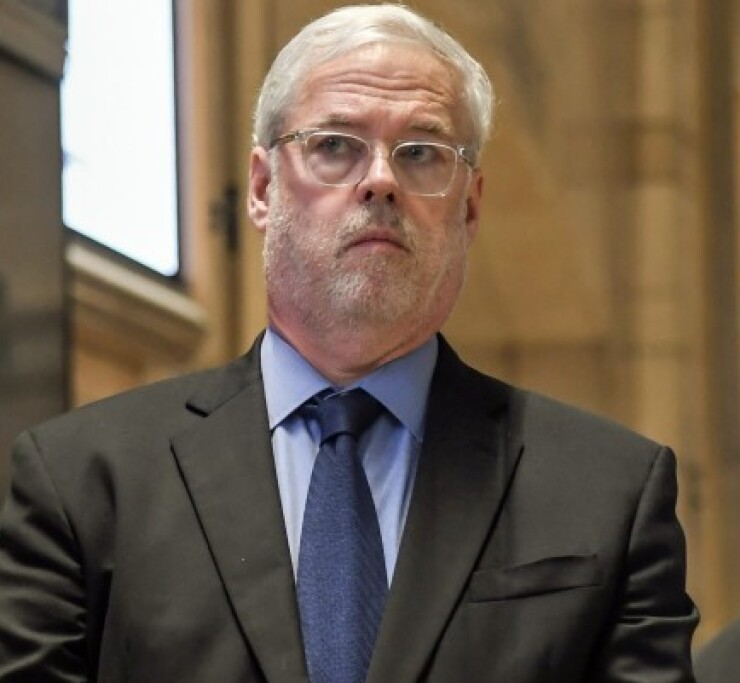Facing a prolonged fiscal calamity, with further federal aid stalled in Washington and its record $51.5 billion capital program in jeopardy, New York's Metropolitan Transportation Authority is examining some harsh alternatives.
The state-approved capital program has been on indefinite hold since March, when the COVID-19 pandemic escalated.
"We are moving closer and closer to a fiscal cliff for the MTA capital program," Chief Development Officer Janno Lieber said at Wednesday's monthly board meeting. "The simple fact is that the capital program of the MTA is frozen because of uncertainties about how much money is going to be available."
The five-year plan, which a state review board approved late last year, had called for signal upgrades, new bus purchases and elevator and other accessibility upgrades, among other modernizations.
The MTA is going through its most acute crisis ever, Chairman Patrick Foye said.
"Our fare and tolls revenues have literally tanked," Foye said. "To be clear, this is a four-alarm fire. Everything has to be on the table."
The MTA, which operates mass transit in the New York City region and is one of the largest municipal bond issuers, has requested $3.9 billion under the federal HEROES Act, matching what it received under the CARES Act, which passed in April. The latest rescue bill, though, has stalled in the U.S. Senate.
"We need help and we need it now," Foye said.
Ridership year-over-year dropped as much as 97% on subways and buses since the pandemic escalated in March, triggering work-at-home mandates and the shuttering of businesses. In addition, the MTA has sustained heavy losses in dedicated taxes and fees.
According to Chief Financial Officer Robert Foran, the authority faces a two-year operating gap of $14.3 billion, including $6.6 billion for 2021. "We have a multiyear problem, which requires a long-term solution," he said.
Absent federal aid, options beyond reducing the scope of the capital program, include layoffs, fare hikes and long-term deficit financing. The latter, Foran said, would be especially challenging.
"We don't have the money to support a long-term deficit financing, so we'd have to create margin, room within out budget to pay at least the interest for a period of time and then the full repayment of these bonds," Foran said.

The MTA must propose its 2021 operating budget next month, adding to the urgency.
Daily ridership on subways exceeded 1 million this week as New York City began the second phase of its reopening, but that's still only 19% of ridership compared to a year ago.
"The timing of another round of MTA federal aid is critical," said Tom Kozlik, head of municipal strategy and credit for Hilltop Securities. "Questions remain about how long it will take for ridership to return. It is also important to consider the future toll social distancing is likely to have on ridership numbers."
According to MTA officials, 132 employees have died from the coronavirus.
The authority, which carries $47 billion of debt including special credits, has received multiple downgrades and warnings to its primary transportation revenue bond credit over three months.
Moody’s Investors Service rates those bonds A2 with a negative outlook. Fitch Ratings also assigns a negative outlook with its A-plus rating. S&P Global Ratings assigns an A-minus rating and has the debt on Creditwatch negative while Kroll Bond Rating Agency rates the bonds AA-plus with a watch-downgrade outlook.
The MTA is eligible to participate in the Federal Reserve's Municipal Lending Facility short-term borrowing program. Speaking to reporters, Foran said the MTA considers the plummeting dedicated taxes and fees as "lost revenue" — per the Fed's criteria — in addition to the farebox dropoff.
"That is the point we'll make," Foran said. "Clearly these are revenues and we would make that argument."
According to data on the Municipal Securities Rulemaking Board's
Finance Committee Chairman Lawrence Schwartz suggested the MTA look to within. "There's still a significant amount of waste in the agency as a whole," he said.
According to payroll
A
The MTA spent at least $2.6 million in overtime costs alone on an intensive overnight outreach program from August 2019 through February 2020.





